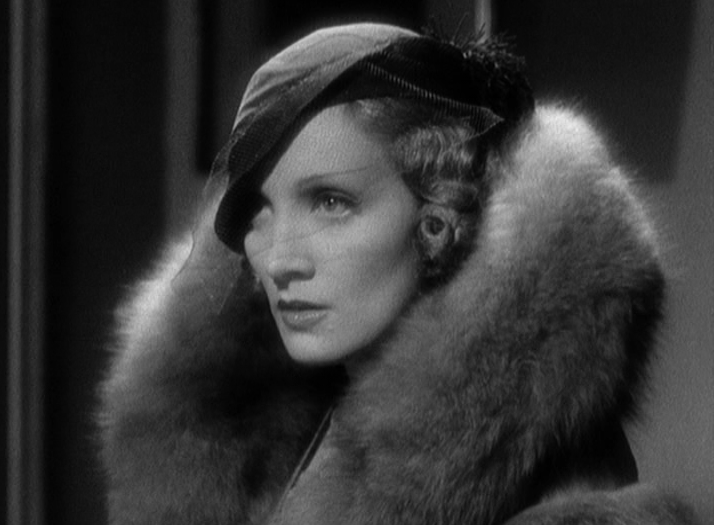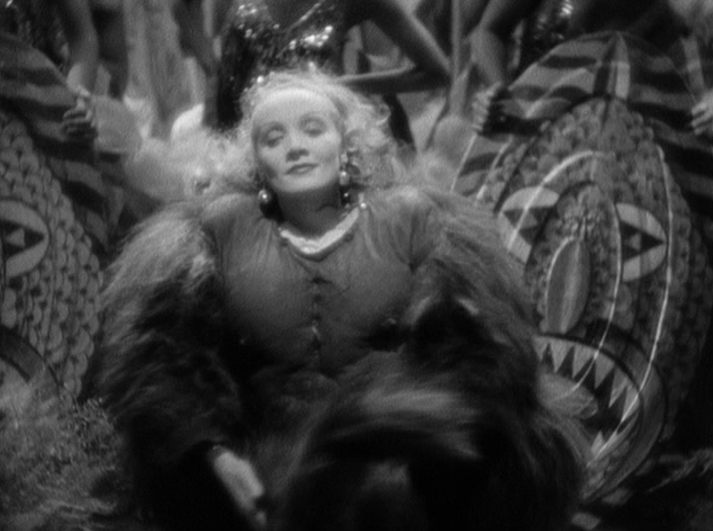For this week's Best Shot Episode: Marlene Dietrich. I asked participants to choose either Morocco (1930) or Blonde Venus (1932).
 Her most fascinating scene in Blonde Venus: the confession.
Her most fascinating scene in Blonde Venus: the confession.
Is Marlene Dietrich a good actress? This question haunted me while watching Blonde Venus, the fascinating Pre-Code movie in which Dietrich plays dozens of archetypes within a brisk 93 minutes: loving mother, drunk floozy, hot temptress, frigid lover, forest nymph, martyred saint, gold digger, confident androgyne, isolated immigrant, jaded bitch, dazzling entertainer. It's enough to give you whiplash if you're trying to get a bead on Helen Jones, her cabaret singer / struggling mother in Blonde Venus (1932).
On the one hand she does everything "wrong." She rarely modulates her voice. Her characterizations aren't especially cohesive -- an impression she gives you in one moment she might take back with force in the very next...
 Her infamous "Hot Voodoo" performance. Neither woman, nor animal, only a star.
Her infamous "Hot Voodoo" performance. Neither woman, nor animal, only a star.
Her face, when it's not singing, settles into such an enigmatic mask that however Josef Von Sternberg and his cinematographer (in this case Bert Glennon) shoot it, she'll remain unknowable; all the light in the world won't reveal her secrets and inky black shadows don't know what they're concealing.
The melodrama-protonoir? story of Blonde Venus tracks the cabaret entertainer Helen Farraday also known as Helen Jones and also known as Blonde Venus (one identity is not enough for Dietrich's face) as she's torn between three men: There's her sick poor husband Ned (Herbert Marshall) who looks amazingly anguished in shadows so he's perfect for a noir; slick millionaire Nick who looks amazingly... amazing since he's played by Cary Grant; And Helen's only child, a little boy named Johnnie (child star Dickie Moore), the only character about which her feelings are (mostly) clear.
 Herbert, Helen, and Nick in the climax. The blocking is so perfect.
Herbert, Helen, and Nick in the climax. The blocking is so perfect.
Since Dietrich's face was made for movie screens, any close-up could make a case for itself as the "Best" Shot. So in an act as perverse as Helen Jones' own fluidity from scene-to-scene, I'm opting for camera work further away and how it tells the story for the choice of Best Shot.
In the middle of the picture, which finds Helen on the run avoiding both men, she's still got her little man to watch over. She leaves him alone when she's performing, much to her husband's fury and the law's disgust. In one amusing scene just before locking him in and going on stage to sing "You Little So and So," they discuss a photo of her in the newspaper which he likes but she rips up. It's a sweet scene in all respects but for the underlying truth that's never discussed: she's a wanted woman, this photo exposes her, and this kid is slowing her down (later in the picture she has scrawled on her dressing room mirror "he who travels alone, travels fastest". In a brilliant bit of business, in terms of composition, lighting, performance and set design, they walk behind this sheer curtain to say their goodbyes. The lighting perfectly shadows little Johnny's actual face while illuminating hers. Meanwhile staring back at us is this distorted mask of a man's face. Wherever Helen goes, there's always a man complicating the picture.
 best shot
best shot
It isn't often that I want a man
But when I do it's just too bad
I know you're acting hard to get, and yet
I've got the feeling you can be had
You so and so, you little so and so
Look what you've done to me.
The question of Dietrich's skill may continue to haunt me but it's a welcome ghost. It can rattle its chains in syncopated "voodoo" rhythms (my god that number) or "oooooooo" at me with a suddenly melodic contralto at any time in the dark.
So the answer doesn't matter. Whether or not Marlene Dietrich is a great actress, she's indisputably among the greatest of stars.